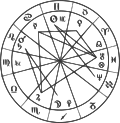List of astrological traditions, types, and systems
Most human civilizations - India, China, Egypt, Mesopotamia, Maya, and Inca, among others - based their culture on complex systems of astrology, which provided a link between the cosmos with the conditions and events on earth.[1] For these, the astrological practice was not mere divination because it also served as the foundation for their spiritual culture and knowledge-systems used for practical purposes such as the calendar (see Mesoamerican calendrical shamans[2]) and medicine (e.g. I Ching). Astrological tradition even contributed to the development of astronomy as the study of the skies provided invaluable insights about celestial bodies. For instance, the Ptolemaic astrological tradition has already listed some of the planets in the solar system and their movements.[3]
The following is an incomplete list of the different traditions, types, systems, methods, applications, and branches of astrology.
Current traditions
Traditions still practiced in modern times include:
- Burmese astrology
- Chinese astrology
- Electional astrology
- Horary astrology
- Horoscopic astrology
- Indian astrology
- Sidereal astrology
- Sri Lankan Astrology (Sinhalese Astrology)
- Tibetan astrology
- Western astrology
- Tropical astrology
Historical traditions
Traditions which were once widely used but have either partly or fully fallen into disuse:
- Agricultural astrology
- Arab and Persian astrology and Islamic astrology
- Babylonian astrology
- Celtic astrology
- Egyptian astrology
- Hellenistic astrology
- Judicial astrology
- Katarchic astrology
- Mayan astrology
- Medical astrology
- Meteorological astrology
- Mundane astrology
- Political astrology
Recent Western developments
Traditions which have arisen relatively recently in the West:
- Cosmobiology
- Financial astrology
- Hamburg School of Astrology
- Heliocentric astrology
- Huber School of Astrology
- Locational astrology
- Psychological astrology
- Sun sign astrology
- Synoptical astrology
- Neon astrolgy
Esoteric systems of astrology
Astrological concepts applied to various esoteric schools of thought or forms of divination:
- Alchemy and astrology
- Chiromancy
- Christianity and astrology
- Esoteric astrology
- Geomancy
- Kabbalistic astrology
- Numerology
- Physiognomy
- Rosicrucianism
- I Ching
- Tarot divination
See also
- Astrology and astronomy
- Astrology and science
- Astrological symbols
- Cultural influence of astrology
- History of astrology
References
- Frawley, David (2005). Ayurvedic Astrology: Self-healing Through the Stars. Twin Lakes, Wisconsin: Lotus Press. p. 3. ISBN 8120831349.
- Burns, William (2018). Astrology through History: Interpreting the Stars from Ancient Mesopotamia to the Present. Santa Barbara, CA: ABC-CLIO. p. 225. ISBN 9781440851421.
- Mancuso, Piergabriele (2010). Sefer Ḥakhmoni. Leiden: BRILL. pp. 321. ISBN 9789004167629.
